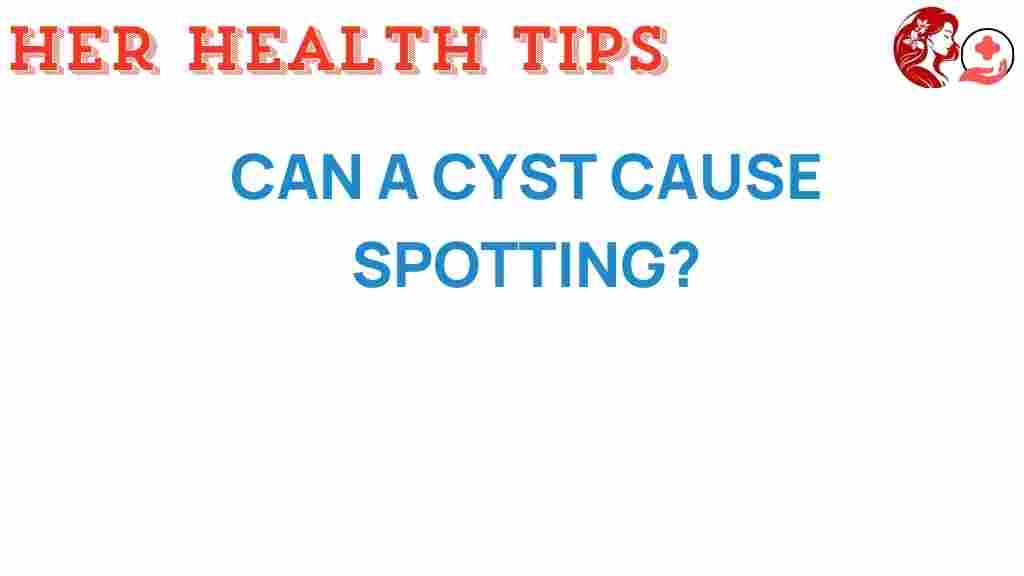Unraveling the Mystery: Can a Cyst Cause Spotting?
Understanding the intricacies of the female reproductive system is essential for maintaining good reproductive health. One common concern among women is the occurrence of spotting, particularly when it seems unrelated to their menstrual cycle. A common question that arises is whether a cyst can cause spotting. In this article, we delve into the relationship between cysts, spotting, and overall menstrual health, exploring the implications of hormonal imbalances and providing information on diagnosis, symptoms, and treatment options.
What is a Cyst?
A cyst is a fluid-filled sac that can develop in various parts of the body, including the ovaries. Ovarian cysts are particularly common and often form during the menstrual cycle. Most cysts are benign and may resolve on their own without treatment. However, understanding their potential impact on reproductive health is crucial.
Types of Ovarian Cysts
There are several types of ovarian cysts, including:
- Functional Cysts: These are the most common type and include follicular cysts and corpus luteum cysts that develop during the menstrual cycle.
- Dermoid Cysts: These contain tissue such as hair, skin, or teeth and can develop from embryonic cells.
- Endometriomas: These develop in women with endometriosis and are associated with endometrial tissue growing outside the uterus.
- Polycystic Ovarian Syndrome (PCOS): This condition involves multiple cysts and is linked to hormonal imbalances.
Spotting and the Menstrual Cycle
Spotting refers to light bleeding that occurs outside of a woman’s normal menstrual period. While it can be alarming, spotting is relatively common and can have various causes.
Can a Cyst Cause Spotting?
Yes, ovarian cysts can potentially cause spotting. The relationship between cysts and abnormal bleeding is often linked to hormonal imbalances that can occur with cyst formation. Here’s how this happens:
- Hormonal Imbalance: Ovarian cysts may disrupt the balance of hormones in the body, leading to irregularities in the menstrual cycle and causing spotting.
- Rupture of Cysts: If a cyst ruptures, it can lead to internal bleeding, which may present as spotting.
- Associated Conditions: Some cysts, like those related to endometriosis or PCOS, can cause additional symptoms, including spotting due to the underlying hormonal issues.
Symptoms of Ovarian Cysts
Many women with ovarian cysts may not experience any symptoms. However, when symptoms do occur, they can include:
- Pain or discomfort in the lower abdomen
- Irregular menstrual cycles
- Spotting between periods
- Pressure or fullness in the abdomen
- Changes in bowel habits
Diagnosis of Ovarian Cysts
If you experience spotting or other symptoms that concern you, it’s important to see a healthcare provider for a proper diagnosis. Diagnosis typically involves:
- Pelvic Examination: A healthcare provider will perform a physical examination to check for abnormalities.
- Ultrasound: This imaging test is often used to visualize the cyst and determine its size and type.
- Blood Tests: Hormonal levels may be assessed to identify any imbalances.
Treatment Options for Cysts
Treatment for ovarian cysts depends on several factors, including the type of cyst, symptoms, and whether it is causing complications. Options may include:
- Watchful Waiting: Many functional cysts resolve on their own, so monitoring without immediate treatment may be recommended.
- Medications: Hormonal birth control can help regulate the menstrual cycle and prevent the formation of new cysts.
- Surgery: In cases of large or persistent cysts, or if there are signs of complications, surgical intervention may be necessary.
Understanding Hormonal Imbalance
Hormonal imbalance plays a significant role in the development of ovarian cysts and can also contribute to spotting. Factors that can lead to hormonal imbalances include:
- Stress
- Poor diet
- Lack of exercise
- Underlying health conditions like PCOS
Addressing these factors can help in managing symptoms and improving reproductive health.
Spotting: When to Seek Help
While occasional spotting may not be a cause for concern, certain situations warrant medical attention:
- If spotting is accompanied by severe pain
- If you experience heavy bleeding
- If spotting occurs after menopause
- If you have other concerning symptoms such as fever or nausea
Natural Remedies and Lifestyle Changes
In addition to medical treatments, several natural remedies and lifestyle changes can support reproductive health:
- Maintain a Healthy Diet: Focus on a balanced diet rich in fruits, vegetables, whole grains, and healthy fats.
- Regular Exercise: Physical activity can help regulate hormones and reduce stress.
- Stress Management: Techniques such as yoga, meditation, and deep breathing can help manage stress levels.
- Herbal Supplements: Some herbs, such as chasteberry, may help balance hormones, but consult with a healthcare provider before starting any supplements.
Conclusion
In summary, while ovarian cysts can potentially cause spotting, the relationship between the two is complex and often linked to hormonal imbalances. Understanding your menstrual cycle and recognizing abnormal symptoms is crucial for maintaining reproductive health. If you experience spotting or other concerning symptoms, it is essential to consult with a healthcare provider for proper diagnosis and treatment. Remember, taking proactive steps in managing your health can lead to better outcomes and improved well-being.
For more information on women’s health and reproductive issues, you can visit WomensHealth.gov. If you have further questions or concerns about ovarian cysts and spotting, don’t hesitate to reach out to your healthcare provider.
This article is in the category Reproductive and created by HerHealthTips Team
